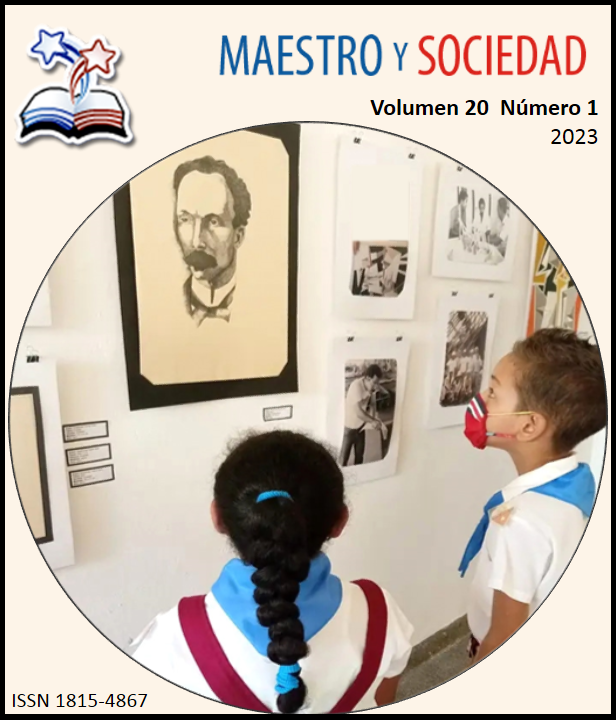Environmental Education from the Geography of Cuba in theninth grade
Environmental Education from the Geography of Cuba in theninth grade
Keywords:
environmental education, activity, teaching activity, extra-teaching activityAbstract
Introduction: The implementation of Environmental Education has come to occupy the center of concerns internationally and in Cuba. For this reason, a study is carried out with the objective of implementing a series of teaching and extra-teaching activities from the contents of the Cuban Geography program in the ninth grade, to strengthen Environmental Education in the students of the Basic Secondary School.
Materials and methods: For this, research methods and techniques are used such as analysis-synthesis, induction-deduction, bibliographic review, observation, percentage calculation, among others.
Results: It reflects that the proposal of activities presented is feasible and applicable, it expands the possibilities that the contents of the program have for the formation of environmental convictions in the students. It also confirms that a control over the process achieves a good evolution of its application and perfects the methodological preparation so that this work has a transdisciplinary character and the sample can be expanded to generalize it in the future.
Discussion: The studies related to Environmental Education are a suggestive topic to demonstrate the contributions that must be taken up for its application in the different educations.
Conclusions: The study evidenced the existing deficiencies in the teaching-educational process regarding the integration of the subjects for the formation of environmental awareness.
References
Cruz, D. (2007). Educación Ambiental y Cultura: Su convergencia en la construcción simbólica de la naturaleza en Educación Ambiental para el desarrollo sostenible. CIGEA y Oficina de la UNESCO en La Habana.
Gaceta Oficial de la República de Cuba. (1997). Ley No 81 del medio ambiente. Extraordinaria Fecha: 11/07/1997 Número: 7.
Márquez Delgado, D. L., Hernández Santoyo, A., Márquez Delgado, L. H. y Casas Vilardell, M. (2021). La educación ambiental: evolución conceptual y metodológica hacia los objetivos del desarrollo sostenible. Universidad y Sociedad, 13(2).
Mc Pherson Sayú. (1997). Concepción didáctica para el trabajo de Educación Ambiental en la formación de maestros y profesores de Cuba. (s.e.).
Musitu Ferrer, D., Esteban Ibáñez, M., León Moreno, C., Callejas Jerónimo, J. E., & Amador Muñoz, L. V. (2020). Fiabilidad y validez de la escala de actitudes hacia el medio ambiente natural para adolescentes Revista de Humanidades, (39), 247-270. https://dialnet.unirioja.es/servlet/articulo?codigo=7429546
Pupo, R. (1990). La actividad como categoría filosófica. Editorial Ciencias Sociales.
Quintero, M. y Solarte, M. C. (2019). Las concepciones de ambiente inciden en el modelo de enseñanza de la educación ambiental. Entramado, 15(2), 130-147. http://dx.doi.org/10.18041/1900-3803/entramado.2.5602
Rojas Domínguez, D., González Fernández, M. y Guevara Rojas, A. (2021). Actividades extradocentes para favorecer la educación ambiental en los escolares de sexto grado. Revista Observatorio de las Ciencias Sociales en Iberoamérica, 2(10), 150-159. https://www.eumed.net/es/revistas/observatorio-de-las-ciencias-sociales-eniberoamerica/junio21/educacion-ambiental-escolares
Vargas Anaya, N., Pérez Pérez, D. y Labrada Piña, L. (2019). Sistema de actividades extradocentes para el desarrollo de los conocimientos en educación ambiental con la implementación del plan de estado para el enfrentamiento al cambio climático en los estudiantes de las diferentes carreras en el CUM. Revista Granmense de Desarrollo Local, 3(1). https://redel.udg.co.cu
Vargas Anaya, N., Rodríguez Castillo, R. y Pérez Pérez, D. (2017). Las actividades extradocentes para favorecer la educación ambiental. Roca, 13(4). https://roca.udg.co.cu
Downloads
Published
How to Cite
Issue
Section
License
Copyright (c) 2023 María Caridad Montero Bizet, Yasmin Zaldivar Montes de Oca, Jorge Luis Montero Bizet, Maikel Ariel Ramos Morales

This work is licensed under a Creative Commons Attribution-NonCommercial-NoDerivatives 4.0 International License.
This journal provides immediate open access to its content, based on the principle that offering the public free access to research helps a greater global exchange of knowledge. Each author is responsible for the content of each of their articles.



























 Universidad de Oriente
Universidad de Oriente 